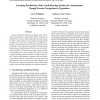286 search results - page 25 / 58 » Using inaccurate models in reinforcement learning |
ICML
2006
IEEE
14 years 8 months ago
2006
IEEE
How should a reinforcement learning agent act if its sole purpose is to efficiently learn an optimal policy for later use? In other words, how should it explore, to be able to exp...
ATAL
2004
Springer
14 years 1 months ago
2004
Springer
Multi-agent research often borrows from biology, where remarkable examples of collective intelligence may be found. One interesting example is ant colonies’ use of pheromones as...
JMLR
2010
13 years 2 months ago
2010
With the goal to generate more scalable algorithms with higher efficiency and fewer open parameters, reinforcement learning (RL) has recently moved towards combining classical tec...
FSR
2003
Springer
14 years 28 days ago
2003
Springer
Current methods for off-road navigation using vehicle and terrain models to predict future vehicle response are limited by the accuracy of the models they use and can suffer if th...
ICMAS
1998
13 years 9 months ago
1998
We describe a framework that can be used to model and predict the behavior of MASs with learning agents. It uses a difference equation for calculating the progression of an agent&...

